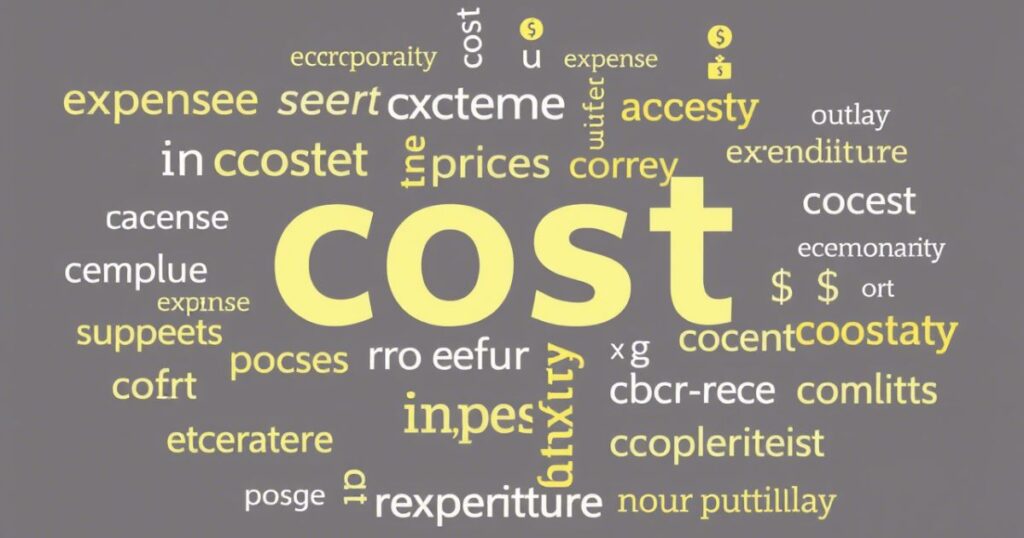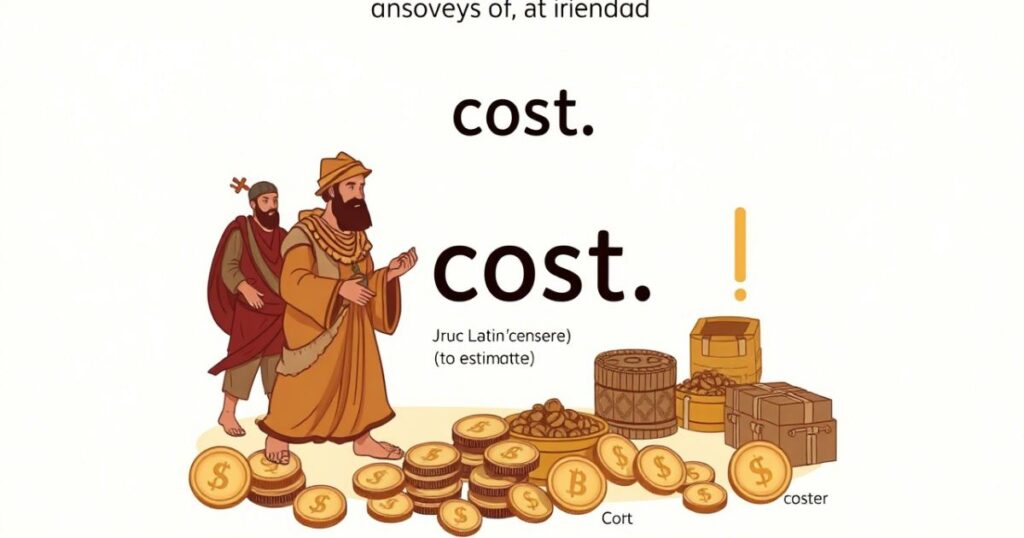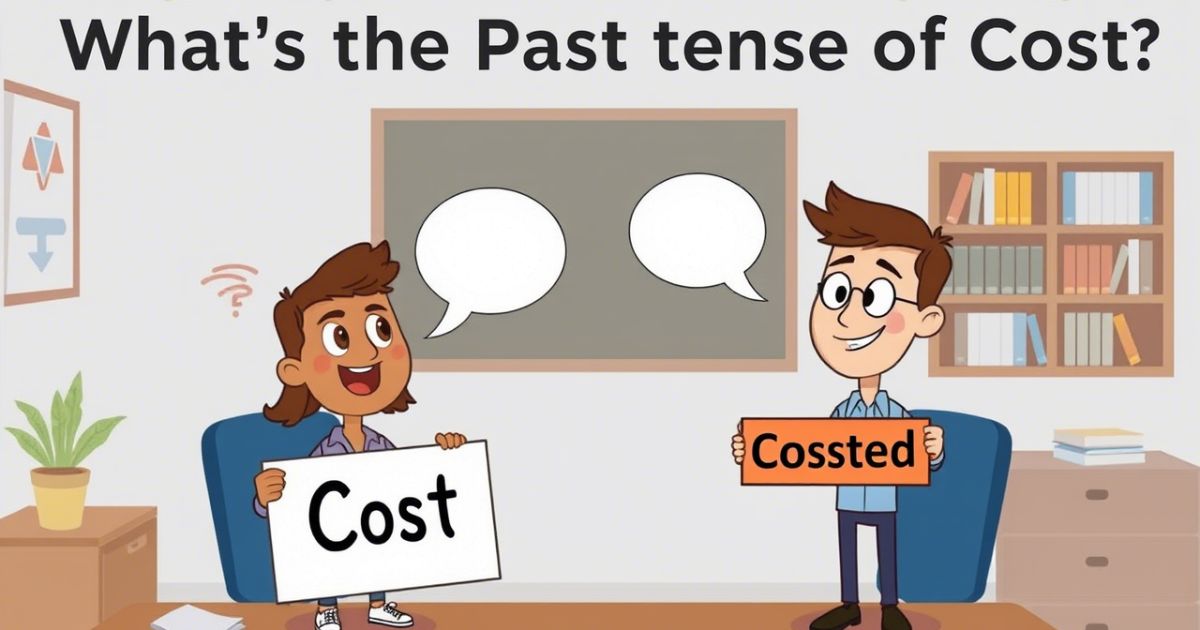When it comes to the verb “cost or costed,” many people get confused about when to use each form. “Cost” is the standard verb used in both the present and past tenses, making it easy to remember in most situations. However, “costed” is used in specific cases, like when discussing calculations or estimations of costs. For example, “costed” is often used in financial contexts where precise figures are required.
The past tense of “cost” is simply “cost,” but in cases where there is a need to show the act of estimating or calculating expenses, we use “costed.” Understanding the difference between “cost or costed” helps you use the verb correctly. Whether you are talking about a past expense or estimating future costs, knowing when to use “cost” or “costed” can clarify your writing and communication.
Why Is There Confusion?

The confusion between “cost or costed” comes from the irregularity of the verb “cost.” Unlike regular verbs, “cost” doesn’t change for the past tense or past participle. So, we say “It costs $5,” “It cost $5 yesterday,” and “It has cost $5 for a while,” using “cost” in all those forms.
“Costed” is used less frequently and typically appears when talking about the act of calculating costs, like in business or accounting contexts. For example, “The accountant costed the project.” In most cases, though, “cost” is the correct choice to describe price or value.
What Does “Cost” Mean?
The word “cost” can have several meanings, depending on the context in which it’s used. Here’s a breakdown of its main definitions:
- Price or Amount Paid for Something: The amount of money required to purchase something or to pay for a service.
- Example: The cost of the car is $20,000.
- Example: The cost of the car is $20,000.
- The Expense or Resource Used in Producing Something: This can refer to money, time, effort, or other resources spent on creating or maintaining something.
- Example: The cost of production has increased due to higher raw material prices.
- Example: The cost of production has increased due to higher raw material prices.
- A Negative Outcome or Consequence: The negative effects or sacrifices involved in achieving something.
- Example: Winning the game came at a high cost—many players were injured.
- Example: Winning the game came at a high cost—many players were injured.
- To Require or Incur a Price: As a verb, “cost” can mean to require a certain amount of money, time, or effort.
- Example: This project will cost us a lot of time.
- Example: This project will cost us a lot of time.
So, “cost” generally refers to the value or sacrifice involved in obtaining something, whether it’s financial or in terms of effort, resources, or consequences.
The Past Tense of “Cost”
In English, “cost” is an irregular verb, which means it doesn’t follow the standard rule for past tense formation. Unlike regular verbs that add “ed” to form the past tense, “cost” remains the same in both its present and past forms. For example, “cost” in the present tense becomes “cost” in the past.
- Example: The car costs $15,000 today.
- Example: The car cost $15,000 last year.
This can cause confusion for some learners of English, as they may expect the past form to be “costed.” However, in most contexts, “cost” serves both as the present and past tense of the verb, making it easier to use in regular conversation.
When “Costed” Might Be Appropriate
While “costed” is less common, it does have its place in certain contexts. It is typically used when discussing the calculation or estimation of a price or expense. In these cases, “costed” refers to the action of determining the financial or resource-related expenditure.
- Example: The team costed the project before beginning work.
- Example: We costed the event to ensure we stayed within budget.
“Costed” might also be found in industries where detailed financial calculations are part of the process, such as accounting, construction, and project management.
Referring to Cost Analysis or Estimation
When talking about “costed,” it often relates to activities that involve estimating or analyzing costs in advance. For example, businesses may cost out a project before committing to it, determining how much it will take to complete based on resources, labor, and materials.
- Example: They costed the materials before deciding on the best option.
- Example: The accountant costed the annual expenses to forecast the budget.
In this context, “costed” helps emphasize the action of calculating or planning expenses rather than simply referencing the price of something.
Emphasizing a Deliberate Action
In some cases, the use of “costed” highlights a specific, deliberate action of assessing or calculating costs. This usage implies intentionality in the process of cost estimation, making it distinct from simply referring to the price of something.
- Example: The manager costed each phase of the construction project.
- Example: They costed the campaign meticulously to avoid overspending.
The action of costing, as seen in these examples, emphasizes effort and precision in determining expenses rather than just noting an existing price.
Related Guide:
Pre vs Post: Which Prefix to Use?
Usage in Professional Jargon
“Costed” is more frequently used in professional or technical jargon, especially in fields that require detailed budget analysis or project planning. In industries like accounting, engineering, and manufacturing, professionals may use “costed” to refer to the formal calculation of expenses.
- Example: The architect costed the project based on market trends and material prices.
- Example: The consultant costed the long-term impact of the investment.
This technical usage is common in environments where financial planning and resource allocation are crucial, and the language reflects that precision.
Verb Tenses for “Cost”
| Tense | Form | Example Sentence |
| Present Simple | cost | The car costs $20,000. |
| Past Simple | cost | The car cost $20,000 last year. |
| Present Continuous | is/are costing | They are costing the project right now. |
| Past Continuous | was/were costing | They were costing the materials last week. |
| Present Perfect | has/have cost | The project has cost more than expected. |
| Past Perfect | had cost | By the time we finished, it had cost $50,000. |
| Future Simple | will cost | The new plan will cost more than we anticipated. |
| Future Perfect | will have cost | By next year, the renovations will have cost over $100,000. |
Notes:
- Irregular Verb: “Cost” is an irregular verb, meaning its form doesn’t change in the past tense or past participle. It remains “cost” in all tenses (e.g., It costs today, It cost yesterday, It has cost before).
- “Costed” Usage: “Costed” is used mainly in specific contexts, like financial analysis or project planning, where it refers to calculating or estimating expenses (e.g., The accountant costed the project).
- General Meaning: “Cost” refers to the price or expense of something, or the amount of resources (like money, time, or effort) required for something to be obtained or produced.
“Cost” and “Costed” in Sentences
The verbs “cost or costed” both relate to the value or expense of something, but they are used in different contexts. “Cost” is the more common form and is used in general statements about price or expenses. “Costed,” on the other hand, is typically used in professional or technical contexts where detailed calculations or estimations of costs are involved.
Examples with “Cost”:
- Present Tense: The shoes cost $50 at the store.
- Past Tense: The renovation cost over $10,000 last year.
- Present Perfect: This project has cost more than we expected so far.
- Future Tense: The new software will cost $200 per user.
Examples with “Costed”:
- Cost Analysis: The team costed the entire project before starting the work.
- Budgeting: The accountant costed the event’s expenses to ensure we stayed within budget.
- Estimation: They costed the materials needed for the construction project last month.
- Detailed Calculation: The consultant costed the long-term impact of the investment before making recommendations.
Synonyms for “Cost” and “Costed”

“Cost” generally refers to the amount of money or resources required to obtain something. Synonyms like “price,” “expense,” and “charge” are commonly used in everyday contexts. On the other hand, “costed” is more specialized and refers to the action of calculating or estimating expenses, with synonyms like “calculated,” “estimated,” and “priced” used in financial and project management settings.
Synonyms for “Cost” (General Use):
- Price – The amount required to purchase something.
- Expense – The money spent on something.
- Charge – The amount billed for a service or product.
- Fee – A payment made for services or privileges.
- Worth – The value of something in terms of money or resources.
- Value – The monetary or practical significance of something.
Synonyms for “Costed” (Specialized Use):
- Calculated – Determined through analysis or estimation.
- Estimated – An approximation of the value or expenditure.
- Priced – The act of assigning a cost or price to something.
- Budgeted – Planned expenses for a project or task.
- Appraised – Assessed in terms of value or cost.
- Valued – Estimated or assessed the worth or cost.
Etymology of “Cost”

The word “cost” traces its origins to the Old French word “coster”, meaning “to be worth” or “to require as a price.” This term developed from the Latin word “constare”, which means “to stand firm” or “to be of equal value.” Initially, it referred to the value of something in a broader sense.
Over time, the meaning of “cost” narrowed to specifically describe the amount of money or resources needed to acquire goods or services. Its evolution highlights how the concept of value and exchange became more tied to financial transactions, particularly as trade and commerce developed in medieval Europe.
FAQ’s
What is the correct past tense for cost?
Is the past tense of cost cost or costed? The right choice depends on the context, especially when calculating expenses.
When should I use cost or costed?
When discussing past events or general expenses, use the simple form. Use costed when referring to estimating or calculating costs for a project.
Can cost or costed be used interchangeably?
No, cost is typically used in the past tense unless discussing an estimation or calculation. Costed is only used for detailed assessments or budgets.
Is cost or costed used in financial contexts?
Yes, costed is commonly used in accounting or project management to refer to cost estimations and budgets. Cost is the general past tense.
Are cost or costed both past tense forms?
While cost is the past tense of cost in most cases, costed is used in specific situations, like estimating or pricing out a project.
Conclusion
Understanding when to use “cost” or “costed” is essential for clear communication. “Cost” is the form used for both the present and past tense in most situations, while “costed” is used when talking about the act of calculating or estimating costs. Knowing the difference between “cost or costed” ensures that your writing is accurate, especially when discussing financial or project-based topics.
When referring to the past tense of “cost,” remember that the past tense for cost is simply “cost,” not “costed.” However, in some specialized contexts, such as cost estimation, “costed” is the proper choice. By understanding the rules for using “cost or costed,” you can avoid confusion and communicate more effectively, whether you’re discussing an actual expense or estimating the cost of something in the future.

Ember Rose is a dedicated administrator with 4 years of experience in efficient operations management and team leadership. Skilled in streamlining workflows and enhancing productivity.

